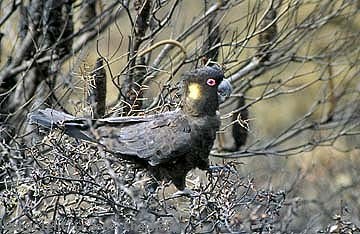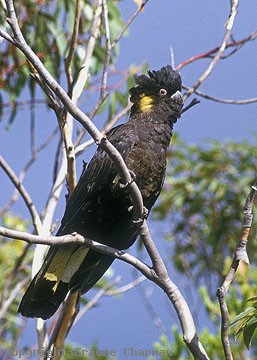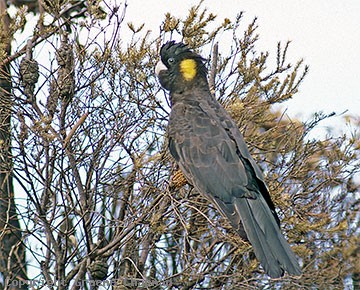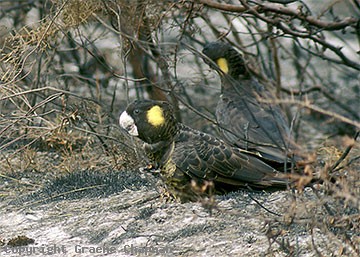Australian Birds
Yellow-tailed Black Cockatoo
Zanda funereus
(Viewing 4 of 12 photos)
|
To those of us who live on the east coast of Australia, "yellow-tails" are the black cockies we see or hear the most. When flying high in the air to and fro from their roosts, their shrill "weee-you" flight calls can be heard from up to a kilometre or so. They travel in pairs, or often in threes if a dependent young one is tagging along. Although they usually lay two eggs, in most cases only a single fledgling leaves the nest and it remains with its parents for up to a year, or occasionally even longer.
Yellow-tailed Black Cockatoos range about as far north as Rockhampton, often inland to Clermont and in the south, across the islands of Bass Strait to Tasmania and also as far as eastern S.A. and Kangaroo Island. Over much of this range, introduced pine plantations are a great attraction and flocks or aggregations of as many as 500 birds are sometimes seen.
Apart from seeds extracted from pine cones, they feed on a range of hard-fruited natives like banksias and hakeas, the occasional "dessert" of nectar (see pic #267206D) or wood-boring grubs which they extract with remarkable efficiency from the stems of shrubs and trees such as acacias.
It doesn't always pay to have a garden full of natives when yellow-tails are around! I watched them feeding on banksias in my garden where they used the huge bill like a pair of secateurs, chopping off whole branches to reach a particular banksia cone. Still, they saved me the job of pruning and no doubt in the wild, they would contribute to the vigour of the plants out there as well.
|

267002 ... Yellow-tailed Black-Cockatoo, male. |

267201 ... Males have a red periophthalmic ring and a dark bill. |
 |

267204 ... Yellow-tailed Black Cockatoo female has a pale coloured bill. |

267205 ... Feeding on fallen Hakea seeds after fire. |
 |
Previous 1 2 3 Next
Return to Photo Library page




